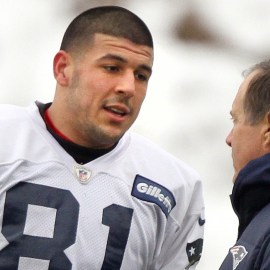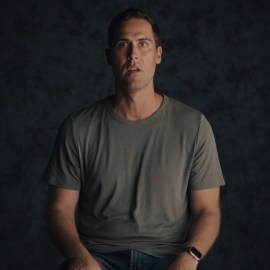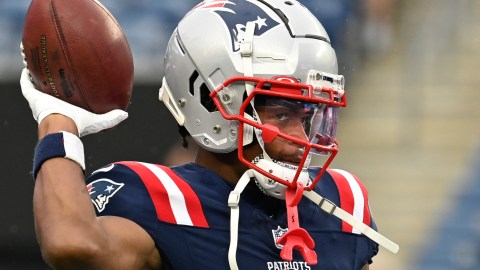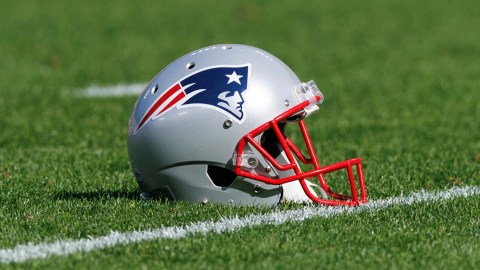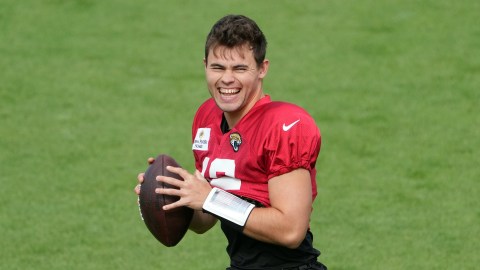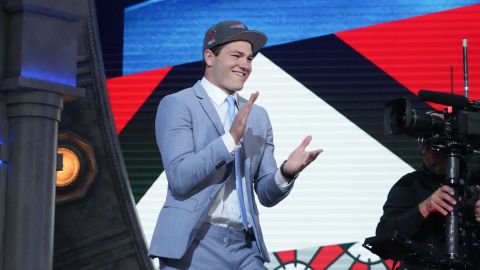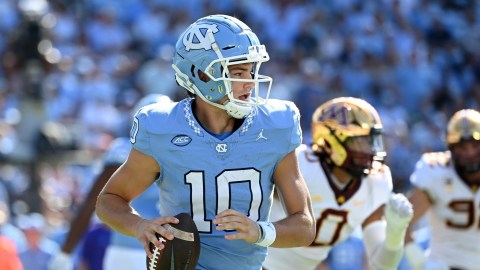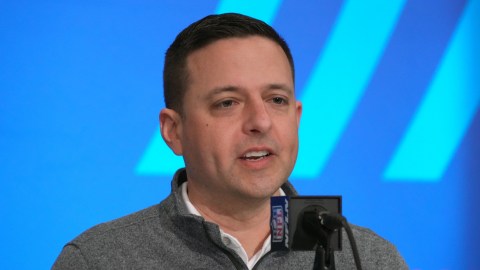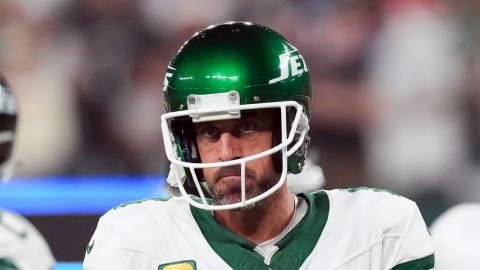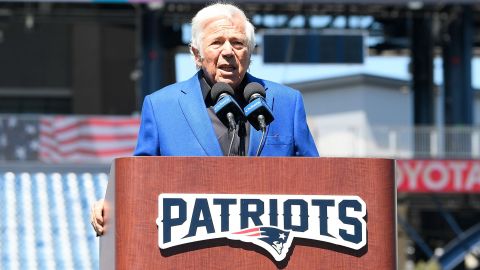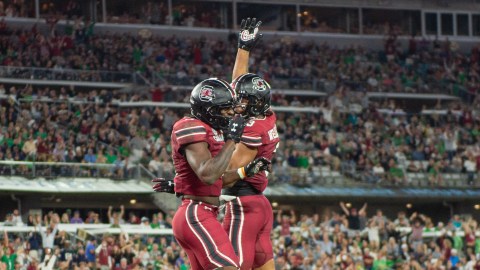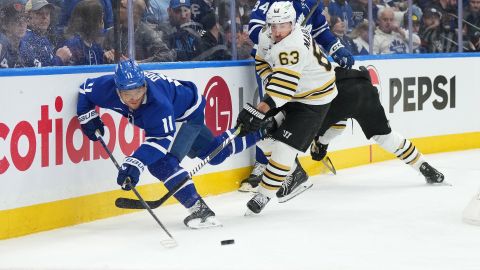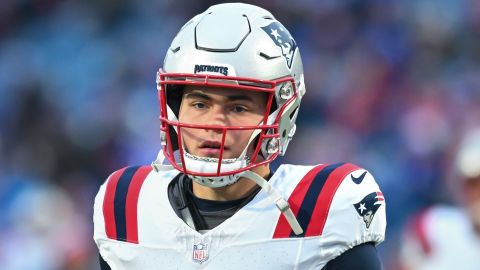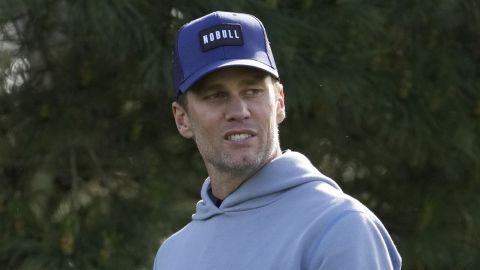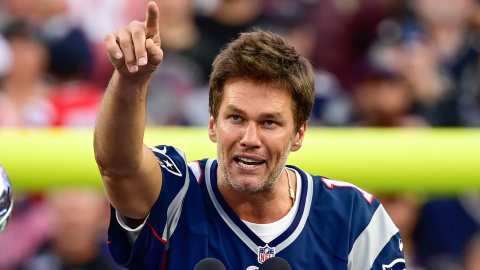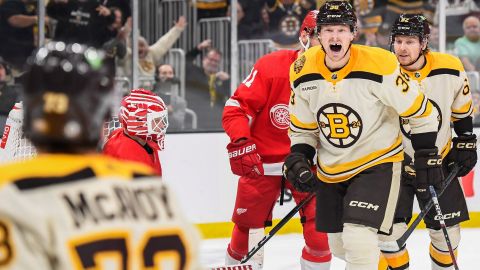“The Dynasty,” a 10-part docuseries about the New England Patriots’ historic run of success, debuted Feb. 16 on Apple TV+. Two episodes are released every Friday, and we’ll dig into each episode with takeaways. Next up: Episode 6.
Episode 1: Backup Plan
Episode 2: The Snow Bowl
Episode 3: Borrowed Time
Episode 4: Spygate
Episode 5: Torn
AT ALL COSTS
The Aaron Hernandez tragedy takes center stage, as the Patriots — desperate to revitalize their dynasty — take a chance on the troubled superstar in the 2010 NFL Draft, a move that proves costly in ways no one could have imagined … even if they should have.
TAKEAWAYS
— It might go without saying, but this is the most powerful episode of the series thus far, and we do get some valuable insight into the Hernandez saga. Before diving into that, though, there was some other non-Hernandez stuff in here.
Story continues below advertisement
— Episode 6 is the introduction to Rob Gronkowski, both in terms of the dynastic timeline and his on-screen contributions. The 2010 NFL Draft, one the Patriots needed to nail and one that completely transformed the franchise forever, is a major plot point. In that draft, Gronkowski obviously was New England’s best draft pick. His start with the organization, though, got off to a bumpy start after just minutes. You might recall the tight end’s raucous on-stage celebration with his family. It went over about as well as you’d expect.
“All of a sudden, I get a phone call from the Patriots and they said ‘Hey, Rob, you can get off the stage now. Enough is enough,'” Gronkowski recalls. “And I’m sitting there like I’m already in trouble. It’s been five minutes since I’ve been on the Patriots, and I’m already in trouble.”
He added: “I can picture Bill (Belichick) being in the draft room like ‘why the (expletive) did we draft this kid?'”
What’s great is we do have draft room footage from that night, and there’s a cut to Belichick watching Gronkowski goof off on the screen. All Belichick can say is “Lord have mercy on us.”
Story continues below advertisement
— Between Gronkowski and Devin McCourty alone, it does end up technically being one of the most important draft classes in Patriots history.
“The top four to five rounds of that draft really end up being the second wave of that Patriots dynasty, and I think we take a lot of pride in that,” McCourty says.
— Ultimately, though, the Hernandez pick overshadows it all. Longtime Belichick right-hand man Ernie Adams sums up the decision to take Hernandez in an uncomfortably basic fashion: “We knew there were issues. But you make a calculation on draft day. look, we’re getting first-round talent for a fourth-round price, and if it doesn’t work out, we can always cut him.”
— There’s also some tremendous footage from the rookie symposium that year where Hall of Fame receiver Cris Carter is lecturing the class, Hernandez included. Carter tells them all about how he didn’t have his life together, and it led to the Eagles cutting him early in his career. Carter eventually turns it over for question, and the first rookie to ask one is … Hernandez.
Story continues below advertisement
“I was just wondering what changes did you make from when you got cut to when you went to Minnesota,” he says.
Eventually, Carter leaves them all with a prophetic message: “Now, right now, this should be the fork in the road for a lot of y’all to get your stuff together before you popped because you gonna get caught. You gonna get caught.”
— Hernandez’s life choices obviously proved horrible and tragic. That understandably overshadows any sort of issues he had as a professional football player, but some of his ex-teammates shed light on those problems, too. Former Patriots receiver Brandon Lloyd was thrilled to chase a ring in Foxboro, but it didn’t take long to realize something was off with Hernandez.
“During training camp, Wes Welker makes this beeline over to me and grabs me by the shoulders,” Lloyd recalls. “He says, ‘Brandon, your locker is in between Gronk and Aaron Hernandez. Aaron, he’s gonna fondle his genitalia in front of you, he’s gonna talk about bathing with his mom, and you’ve just gotta ignore it.’ It’s like Wes had seen a ghost the way he was looking at me.”
Story continues below advertisement
— Deion Branch was essentially the Hernandez whisperer. It’s downright painful to watch him recall certain things or wonder whether he should have seen it all coming, as the person who technically was closest to Hernandez.
“I hope people don’t take this the wrong way,” he says early in the episode. “You only know what someone is to the core, and you can only judge them by what you see. I have some moments where I’m just like, ‘You should have seen that. Like, Deion, you should have seen that.”
It’s clear that being the go-to guy for the coaching staff when it came to Hernandez wore on him.
“Any time Aaron was boiling, Coach would always ask me, ‘Is everything good? Is everything good? Is everything good?’ It was, like, ‘Check with Deion.'”
Story continues below advertisement
— Welker and Lloyd especially make it clear that Hernandez’s act wore thin on his teammates. Lloyd shares a story about how during a walkthrough once, Hernandez was goofing off and calling Belichick “daddy” during drills. Eventually, Tom Brady had enough, and told Hernandez to “get the (expletive) off the field.”
Wellker, meanwhile, recalled Hernandez — as a rookie — demanding during a punt-return drill that the Patriots use him as the returner. Belichick laughed it off, much to Welker’s confusion.
“I’m like, why does he love this guy? I don’t get it. I don’t get it. But when you’re that talented, a lot of people will put up with a lot of stuff.”
Lloyd concurred: “It reminded me of being on teams where they let the star players do what they want to do. It doesn’t matter how you win, as long as you win.”
Story continues below advertisement
— For as much hassle as Hernandez could be in the workplace, it was made clear to Lloyd and other Patriots players not to hang out with him outside the facility.
“All the warnings were ‘Do not hang out with Chico (Hernandez). Do not hang out with Chico.’ That was the code. ‘For your own safety, do not hang out with Aaron.’ So, something was known.”
That “something was known” feeling kind of lingers in the episode. Obviously, Hernandez had the run-in at Florida, and he had an incident a year after being drafted, too. Professional sports teams have their own security and plenty of law-enforcement connections. Maybe no one could have guessed what Hernandez was truly capable of, but it’s also not surprising to hear they knew enough to tell players to essentially stay away from him.
— Belichick kind of takes a beating in this episode, too. The Welker and Lloyd comments allude to a feeling from the coaching staff that Hernandez simply was too valuable to let go. That much is insinuated, too, when the story of Hernandez’s reported request to be traded to the West Coast — away from his friends and family in New England — to basically get away from his troubled life.
Belichick stiff-arms the question in his only sitdown appearance of the episode: “It’s an unfortunate situation about Aaron, and I don’t have anything to add to it.”
more ‘the dynasty’
— Adams, meanwhile, essentially speaks for Belichick, or at least for the Patriots football operation.
“We knew he wasn’t the ideal citizen, but did we ever suspect this was a guy who was going to be running around shooting people with guns? No,” Adams says. “Aaron was obviously a very talented player, he got a big-time contract, which no in retrospect, we shouldn’t have done that. Probably the best thing for Aaron Hernandez’s pro football career and his life would have been to go to the Seattle Seahawks.”
— The murder story itself and everything that followed is still hard to comprehend a decade later. Right in the middle of arguably the greatest dynasty in American pro sports, a star player is convicted of murder. It would be hard to believe in a movie or TV show.
— The Patriots released Hernandez hours after he was arrested. Patriots president Jonathan Kraft takes credit for that move, while also kind of dumping on Belichick in the process.
“Whatever warm feelings we have toward Aaron, it looks like he did the ultimate bad thing and he can’t — we can’t have him on our team any longer,” Jonathan Kraft says. “At that time, my dad and Bill were both out of the country, but I felt strongly we couldn’t wait. I called my dad, and he very much agreed.
“We called Bill, and Bill as is his wont, was always more measured. In the beginning, he said ‘He’s not guilty yet,’ and there are competitive issues, too. He didn’t want to lose an amazing football player. Bill’s instinct would be to play this (expletive) thing out to the end, and I just knew we couldn’t play it out until the end. Not because of how it looked on us but because we had to set a (expletive) example. It’s like, this guy’s a murderer.”
— Which brings us to Robert Kraft. We get a lot of insight into Kraft’s psyche about how he handled Hernandez from the beginning. He obviously could have pushed back on draft night and didn’t. He then gave Hernandez the life-changing contract extension after two seasons. He knew Hernandez was struggling with everything off the field, too.
One of the most striking scenes of the entire episode is a mic’d-up training camp scene involving a conversation between Kraft and Belichick.
“I was most impressed with Hernandez, how he came in today,” Kraft says to Belichick. “I think he’s got such a good heart. He’s a good guy. … He told me he had to be careful with people around him now. He recognizes it himself. He’s come into so much money.”
— It also speaks to how success can go to your head. Kraft thought because all the success he, his family and the team had over the years that they could get Hernandez on the straight and narrow. He seemingly believed because the Patriots won more football games than everyone else, that legitimized this culture and everyone could be saved.
“We knew there were some issues outside of our building, but it was our hope and desire that the Patriot Way would be a great influence on him.”
— Kraft, though, loves to be loved. Hernandez at least gave off that impression, to the point where Kraft admits — even after all that went down — that he basically looked at Hernandez like a son. Hernandez either preyed on that or was just so lost it didn’t matter. Either way, Kraft couldn’t help himself, especially when Hernandez donated $50,000 to a foundation in memory of Kraft’s late wife Myra.
“It really touched me. I felt he was what we wanted as the perfect Patriots player,” Kraft says.
— Even when Hernandez is first connected to the Odin Lloyd murder and he went on that bizarre run across southern Massachusetts that ended up at Gillette Stadium, Kraft didn’t believe it. He recalls asking Hernandez for the truth, even offering to set him up with the best defense attorney money could buy because surely there was a good reason behind all of this.
Instead, Hernandez lied to his face. Kraft, to his credit, makes some difficult admissions years later.
“When he said it, I believed him,” Kraft says. “He actually changed my life and how I look at people because it, just, I, to this day, I can’t believe I got snookered like that.”
— The episode ends with this powerful statement from Kraft:
“When we bought the team, I said we could make a difference in our community and make things better. We didn’t in this case. Their parents wake up every day without their sons. A young daughter, without her father. We messed up in this one, and for those of you who feel pain, I apologize.”
Episode rating: 9.5/10
It’s a heartbreaking story, but it was a compelling 30 minutes of TV.
Screenshots used with permission via AppleTV+
Featured image via Apple TV+
